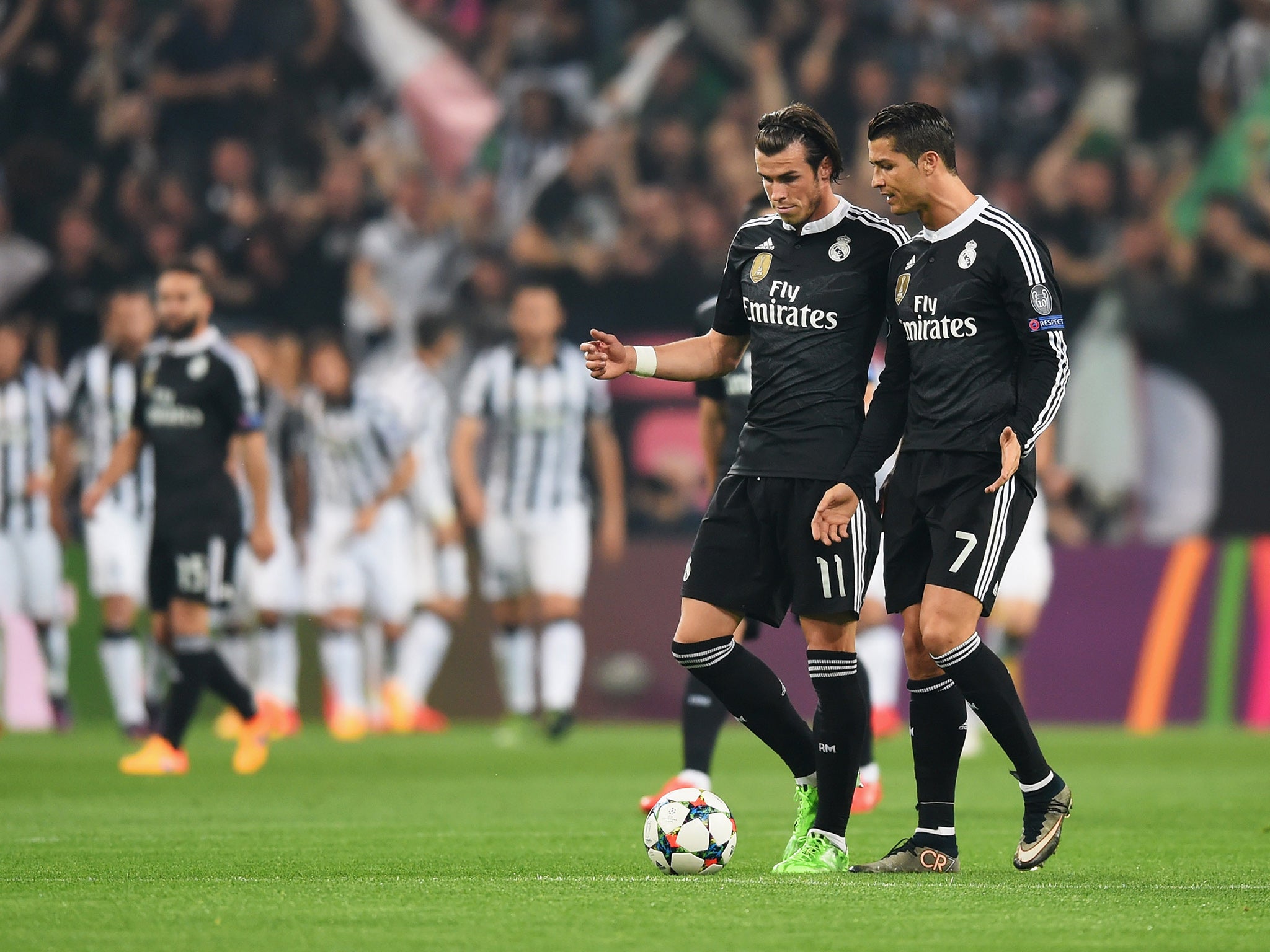Your support helps us to tell the story
From reproductive rights to climate change to Big Tech, The Independent is on the ground when the story is developing. Whether it's investigating the financials of Elon Musk's pro-Trump PAC or producing our latest documentary, 'The A Word', which shines a light on the American women fighting for reproductive rights, we know how important it is to parse out the facts from the messaging.
At such a critical moment in US history, we need reporters on the ground. Your donation allows us to keep sending journalists to speak to both sides of the story.
The Independent is trusted by Americans across the entire political spectrum. And unlike many other quality news outlets, we choose not to lock Americans out of our reporting and analysis with paywalls. We believe quality journalism should be available to everyone, paid for by those who can afford it.
Your support makes all the difference.The day before the European Cup semi-final, Gareth Bale was approached by a group of Real Madrid fans with a camera phone. They wanted a picture; the trouble was they wanted one of themselves with James Rodriguez and they wondered if the world’s most expensive footballer would take it. Naturally, the Welshman obliged.
In the passageways of the Juventus Stadium in the wake of Real’s 2-1 defeat there were a couple of journalists waiting not to speak with any Madrid player but to have their photos taken with them. Had Woodward and Bernstein taken that approach to Watergate, they would have asked for Richard Nixon’s autograph rather than exposing him as a crook.
They were not particularly interested in posing with Bale, which was just as well because he was in no mood to chat. According to the Uefa statistics, he had made fewer passes and taken fewer touches of the ball than Real Madrid’s keeper, Iker Casillas.
Had Bale’s family watched ITV’s coverage of the semi-final, they would not have enjoyed the analysis from Turin. Roy Keane, who in this city in 1999 had turned a European Cup semi-final that had seemed hopelessly lost Manchester United’s way, had been damning.
He argued Madrid were playing “with 10 men because Bale gave them absolutely nothing”. Keane went on: “He kept making the easy decision. The reason he is at Real Madrid is to be brave and to get at people. But every time he got the ball, he turned back. ”
In the eyes of the Italian press, who had seen him destroy Internazionale when he was still a Tottenham player, Bale had been an irrelevance. “Banal” was the headline in one newspaper.
It would, of course, have been too much to have expected anyone bar Real’s manager, Carlo Ancelotti, to have pointed out that Bale was not fully fit and that he had only made his comeback from injury at the weekend, when his cross against Seville had allowed Cristiano Ronaldo to celebrate his hat-trick in a match won by the odd goal in five.
In what has proved a difficult second season at the Bernabeu, Bale has averaged a goal every other match – roughly the same ratio as Wayne Rooney. And yet Rooney’s command of a foreign language, or the way he mixes outside the training ground, or the way Ronaldo looks at him, is not analysed to death in the pages of Madrid’s sports paper, Marca.
In his later years at Old Trafford, Sir Alex Ferguson became something of a snob when it came to newspapers, ignoring the man from the Manchester Evening News and granting extensive interviews to Gazzetta dello Sport and L’Equipe. He never allowed Marca anywhere near his training ground.

Marca and the Real Madrid president, Florentino Perez, have been at war for several months now and Bale has become the newspaper’s chief and easiest target. It matters not that Bale struck an astonishing winner against Barcelona in the final of last season’s Copa del Rey or scored in the European Cup final against Atletico. That credit, which at Manchester United would sustain a man for a couple of seasons, long ago ran out.
Instead, Bale is portrayed as Perez’s creature, a man the president considered worth more than Ronaldo, whose precious away goal in Turin brought him level with Alfredo di Stefano in the list of Real’s all-time leading scorers.
There have been reports of Perez asking Ancelotti why Bale was subbed or not selected and on Tuesday night, as Juventus regained a lead they could and should have extended, it seemed bizarre Ancelotti should have chosen Isco rather than Bale as the first man to be brought off. It was strange but not as odd as his choice of Sergio Ramos as a central midfielder.
Like everyone who manages Real Madrid, Ancelotti finds himself seated on a throne of bayonets. Facing the club with whom he enjoyed less success than anywhere else in his managerial career, Ancelotti made too many mistakes, one of which was probably not starting with Javier Hernandez, who had scored the winner against Atletico in the quarter-finals, rather than Bale.
Had Fernando Llorente scored for Juventus late on, the tie might already be out of Real’s reach. As it was, Rodriguez could promise that Madrid’s footballers “would be out to kill”. The Bernabeu will be an intimidating place on Wednesday night – and it might not be just the Juventus players who feel the fear.

Join our commenting forum
Join thought-provoking conversations, follow other Independent readers and see their replies
Comments